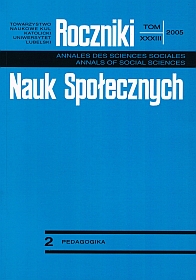Filozofia wychowania do prawdy
Abstrakt
The paper deals with a normative characterisation of education and, to be more precise, with the problems, values, and modes of forming for the principal cognitive value, which is truth. In its aspect of formation for truth, education reveals two dimensions: negative and positive. The negative aspect stresses in the formative process the unmasking of lies and opposition to this main deformation of appropriate formation. The paper addresses also such aspects as the attitude of the liar (e.g. confession and contrition), the aspect of forgiveness and reparation, both in its social and anthropological-theological dimension. The more important dimension in formation is the positive dimension. It consists in establishing a truthful relationship between the educator and the pupil. It is especially important in the formative process to lay stress on the critical awareness of the pupil and the sapiental domain of truth, to which the educator should direct his or her pupil. If one of this spheres of activity is missing, or there is no testimony, the relationship between the educator and the truth may be deformed. The paper comes to a close with some remarks on self-formation, which is the key dimension of man's formation. Education and educators seek not so much to inform or form the other person, but to show, lead, and make present to their pupil the most essential values for the personal life.
Copyright (c) 2005 Roczniki Nauk Społecznych

Utwór dostępny jest na licencji Creative Commons Uznanie autorstwa – Użycie niekomercyjne – Bez utworów zależnych 4.0 Międzynarodowe.


